List of German dishes
Below is a list of dishes found in German cuisine.
Famous dishes
| Name |
Image |
Region |
Description |
| Aachener Printen |
 |
Aachen |
A type of gingerbread that is typical for the city of Aachen. |
| Apfelkuchen |
 |
Throughout Germany |
German pastry consisting of sliced apples |
| Bratkartoffeln |
 |
Throughout Germany |
Fried potato slices, often with diced bacon and/or onions |
| Bratwurst |
 |
Throughout Germany |
Sausage that is usually composed of veal, pork or beef.....a traditional German sausage. Not to be confused with curry wurst. |
| Currywurst |
 |
Berlin, Rhine-Ruhr |
This large-format, fried or grilled sausage is cut into thick slices and seasoned with spicy ketchup and generous amounts of curry powder, usually served with french fries — a popular snack originating in early 1950s Berlin. Both Bockwurst-style (i.e. intended to be boiled) and Bratwurst-style (i.e. intended to be grilled or fried) sausages are used, depending on region, and the use of one or the other is a matter for much debate among Currywurst gourmets. Currywurst remains one of the most popular fast foods in Germany, especially in Berlin and the Rhine-Ruhr area, but the Döner kebab is gaining rapidly in popularity. |
| Fischbrötchen |
 |
Northern Germany |
Sandwich made with various fish (pickled or fried) and onions, common in Northern Germany, particularly along the coast |
| Hendl |
 |
Austro-Bavarian |
Whole grilled chicken marinated with pepper and other spices this dish is known as Brathühnchen, Brathähnchen, and in eastern Germany, also as Broiler. |
| Hasenpfeffer |
|
|
A stew made from marinated rabbit |
| Kartoffelsalat |
 |
Northern Germany and South Germany |
Potato salad, which comes in many varieties, for example in a cream or mayonnaise dressing (northern Germany) or even in meat broth (south Germany), is often served as a side dish to Bratwurst or boiled sausages). |
| Königsberger Klopse |
 |
East-Prussian: city of Königsberg |
Cooked meatballs served in a white sauce with capers |
| Kohlroulade |
 |
Throughout Germany |
German-style cabbage rolls |
| Marzipan |
 |
Throughout Germany |
E.g. Lübeck-style, widely used in Christmas specialities |
| Mettbrötchen |
 |
|
A kind of sandwich made with raw Meat on bread rolls (Brötchen), frequently with a garnish of minced raw onion |
| Pellkartoffeln |
 |
Throughout Germany |
Potatoes boiled or steamed before peeling (young potatoes may be eaten unpeeled), served with Quark and linseed oil, butter, or as a side dish with herring) |
| Pfefferpotthast |
|
Westphalia |
Peppered beef stew |
| Rouladen |
 |
Throughout Germany |
A roulade of bacon and onions wrapped in thinly sliced beef |
| Sauerbraten |
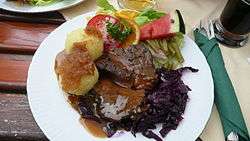 |
Rhineland |
A beef pot roast marinated in vinegar, water, spices and seasonings |
| Sauerkraut |
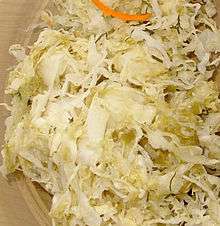 |
Throughout Germany |
Fermented shredded cabbage |
| Schweinshaxe |
 |
|
Pork hock served grilled and crispy with Sauerkraut or boiled as Eisbein |
| Spanferkel |
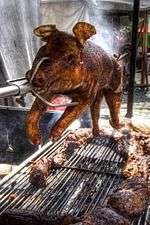 |
Throughout Germany |
A grilled whole young pig, usually eaten in a large company of friends or guests |
| Speckpfannkuchen |
|
|
Large, thin pancakes with diced, fried bacon |
| Spätzle |
 |
Southern Germany |
These hand-made noodles are very popular and are an important ingredient of several dishes, such as Linsen mit Spätzle or Käsespätzle. |
| Stollen |
 |
Dresden |
A bread-like cake with dried citrus peel, dried fruit, nuts, and spices such as cardamom and cinnamon; it is usually eaten during the Christmas season as Weihnachtsstollen or Christstollen. The best-known Stollen is from Dresden and is sold at the Striezelmarkt Christmas market, which derives its name from the cake. |
| Weihnachtsgans |
_1.jpg) |
Throughout Germany |
A roasted goose is traditionally consumed on December 25 Christmas Day. |
| Knödel (also known as Kloß, depending on region) |
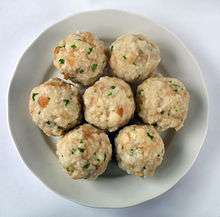 |
Throughout Germany |
German dumplings; many different variations:
- Semmelknödel (dumplings made with bread crumbs)
- Rohe Kartoffelknödel - dumplings made from potatoes not cooked prior to forming and boiling the Knödel
- Gekochte Kartoffelknödel - dumplings made from potatoes cooked prior to forming and boiling the Knödel
- Halb-und-halb Kartoffelknödel: half the potatoes are cooked first, the other half are not
- Halbseidene
|
Baden-Württemberg
| Name |
Image |
Type |
Description |
| Maultaschen |
 |
Main course |
Noodle filled with various ingredients, such as meat, spinach, onions, spices: Maultaschen are either served with broth or cut into slices and fried with eggs. |
| Sauerbraten |
 |
Main course |
A vinegar-marinated roast traditionally made of horse meat, although nowadays the majority is made of beef. |
| Sauerkraut |
|
Side dish |
Sauerkraut in Baden-Württemberg is made with the special Filderkraut (pointed cabbage is considered the most delicious variety: Filderkraut). |
| Spätzle, Knöpfle |
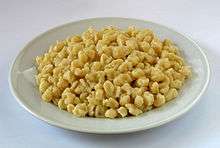 |
Pasta |
Two varieties of soft, thick noodles. |
| Linsen mit Spätzle |
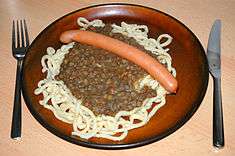 |
Main course |
Hearty dish that combines Spätzle with cooked lentils and Vienna sausages. |
| Schupfnudel |
 |
Pasta |
Pasta made from potatoes and flour, often served with Sauerkraut. |
| Flädlesuppe |
 |
Entree |
A broth with thin strips of German-style pancakes. |
| Springerle |
 |
Snack |
Cookies made by pressing dough into intricate molds. Commonly used for dunking into a drink, as they are quite hard. |
| Zwiebelkuchen |
 |
Main course |
An onion cake, a seasonal dish served around October, usually eaten while still warm and accompanied by slightly fermented red or white grape juice called Süser or (more commonly in other regions) Federweißer. |
| Gaisburger Marsch |
 |
Main course |
A famous stew made of meat, potatoes and several kinds of vegetables. |
| Käsespätzle |
 |
Main course |
Dish of Spätzle and fried onions gratinated with cheese. |
| Wibele |
 |
Snack |
Small, sweet biscuits. |
Bavaria
| Name |
Image |
Type |
Description |
| Weißwürste |
 |
Snack |
Lt.:'White sausages'; a speciality from Munich, traditionally eaten for second breakfast. Always accompanied by sweet mustard, pretzels, and wheat beer. Traditionally not served after 12 noon because in earlier days, before fridges, the sausages had to be consumed before 12 noon so that they didn't decay. But, nowadays, people also eat it for dinner or lunch. |
| Weizenbier/Weißbier (wheat beer) |
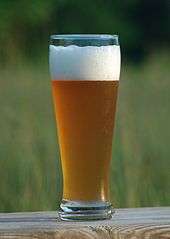 |
Beverage |
Wheat beer |
| Helles Bier (Helles) |
.jpg) |
Beverage |
Helles is a German beer style that is usually drunk in Bavaria, Germany. It has a yellow, gold color, and has 4.5-6% alcohol. |
| Radler |
.jpg) |
Beverage |
A beer mixed with citrus lemonade |
| Russ |
|
Beverage |
Wheat beer mixed with lemonade. The name Russen (Russian) comes from the fact that after World War I, the left wing party, Genossen, mixed their beer with lemonade because they did not want to get drunk so quickly. In Munich, these members of left wing parties were called Russians (based on their political beliefs), and also their beer was named after this fact. Often also consumed in a one-liter mug, called the Maß (Russen Maß). |
| Schweinsbraten |
 |
Main course |
Sliced pork roast with a crunchy crust that was boiled in a pot. |
| Schweinshaxe |
 |
Main course |
Braised pork leg with a crunchy brown crust on the outside, and a moist and juicy inside. Served with gravy and Klöße. |
| Leberkäse |
 |
Snack |
A type of sausage baked in a mould and cut into slices. When eaten as a main course, it is sliced and served with an egg (must be sunny side up style), and mashed potatoes. For a quick lunch, it is usually eaten in a bread-roll with mustard, a bit like a hotdog. Some people eat the Leberkäse with hot mustard, others with sweet mustard. |
| Schlachtschüssel |
 |
Snack |
Lt.: Butchers plate; a combination of Blutwurst and Leberwurst (blood sausage and liver sausage), served hot on sauerkraut. |
| Saures Lüngerl |
|
Main course |
A ragout from lung and sometimes heart from the veal. |
| Bayrisch Kraut |
 |
Side dish |
Shredded cabbage that is cooked in beef stock with pork lard, onion, apples, and seasoned with vinegar. |
| Kartoffelsalat |
 |
Side dish |
Bavarian potato salad is usually made with broth, bacon bits and onions and may be served hot or chilled. |
| Radi |
 |
Side dish |
Raphanus that is heavily salted so the water is extruded. |
| Pichelsteiner |
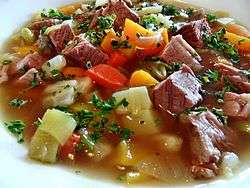 |
Main course |
A stew made from various kinds of meat and vegetables. |
| Bayrisch Creme |
 |
Dessert |
A very light, fluffy, and not too sweet dessert made from gelatin, milk, cream, egg yolk, and sugar. |
| Prinzregententorte |
 |
Cake |
A cake that consists of seven thin cake layers with chocolate buttercream in between. |
| Topfenstrudel (or Milliramstrudel) |
 |
Cake |
Similar to Apfelstrudel, but filled with topfen instead, and served with vanilla sauce. |
| Dampfnudel |
 |
Main course |
Lt.:'steam noodle'; a sort of white bread made of yeast dough, steamed in a pan and then served with various toppings, e.g. sugar, cinnamon, poppy seeds, jam, butter and vanilla sauce. |
| Buchteln |
 |
Main course |
Sweet dumplings made of yeast dough, filled with jam, poppy seed paste, or curd, and baked in a large pan so that they stick together. The traditional Buchtel is filled with plum powidl jam. Buchteln are topped with vanilla sauce, powdered sugar, or eaten plain and warm. |
Berlin
| Name |
Image |
Type‡ |
Description |
| Beamtenstippe |
|
Sauce |
A either white or brown sauce that is eaten with potatoes. |
| Buletten |
 |
Main course or snack |
Kind of meatballs in Berlin |
| Currywurst |
 |
Snack |
Hot pork sausage served either with curry ketchup or a tomato paste with curry powder. |
| Eierkuchen |
 |
Main course |
Pancake |
| Eisbein |
 |
Main course |
Ham hock usually served with Sauerkraut. |
| Hackepeter |
 |
Snack |
Raw ground pork that is spiced with salt and pepper, garlic and caraway. |
| Kartoffelpuffer |
 |
Main course |
Grated potatoes that are mixed with eggs, spices and other ingredients, portioned and fried in a pan. Usually served with some kind of meat or sweet with applesauce. |
| Königsberger Klopse |
 |
Main course |
Cooked meatballs served in a white sauce with capers and usually eaten with potatoes. |
| Pfannkuchen (name in other regions: Berliner) |
 |
Pastry |
Sweet dough dumplings, fried in fat or oil, filled with jam and glazed with confectioner's sugar. Also known simply as "Berliner" or, in the eastern part of Germany, including Berlin itself, "Pfannkuchen". In Bavaria they're called "Krapfen". |
Bremen and Lower Saxony
| Name |
Image |
Type |
Description |
| Birnen, Bohnen und Speck |
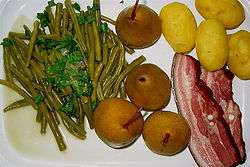 |
Main course |
A dish of pears, beans and bacon, invariably accompanied by potatoes. |
| Bratwurst |
 |
Snack |
A grey sausage with veal content that has a mild flavor, is pan-fried and then eaten with a hard roll. |
| Braunkohl |
|
Side dish |
see Grünkohl below |
| Braunschweiger |
 |
Snack |
An internationally known sausage that is spread on toast or used in sandwiches. |
| Bregenwurst |
 |
Snack |
A specialty sausage, usually served with Grünkohl |
| Bremer Kükenragout |
|
Main course |
A ragout made from different kinds of meat and seafood as well as vegetables; may contain no chicken and if it does it's meat from very young chicken. |
| Brunswick Mum |
|
Beverage |
An ancient beer from Brunswick. |
| Butterkuchen |
 |
Cake |
A sheet cake made from yeast dough topped with blops of butter and sugar. |
| Calenberger Pfannenschlag |
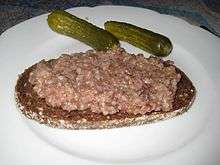 |
Snack |
Groats that are broiled and eaten with potatoes or on bread with various other side dishes, e.g. pickles or red beet; special kind of Knipp. |
| Pinkel mit Grünkohl |
 |
Main course |
A dish made from slowly cooked kale that is served with Pinkel, a rather salty sausage. |
| Kassler |
 |
Main course |
A slowly cooked salted pork dish that is usually served with Knödel and Sauerkraut or potato salad. |
| Kluntjes |
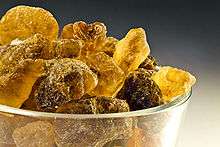 |
Candy |
Sugar crystals that are used as sweetener for tea. |
| Knipp |
 |
Snack or Main course |
Broiled groat sausage. |
| Labskaus |
 |
Snack or Main course |
A dish made from corned beef, herring, mashed potatoes, and beetroot, served with a fried egg and a pickled cucumber. |
| Nordseekrabben/Nordseegarnelen |
 |
Snack or Main course |
Prawns from the North sea. |
| Pottwurst |
 |
Snack |
Another kind of Knipp. |
| Räucheraal |
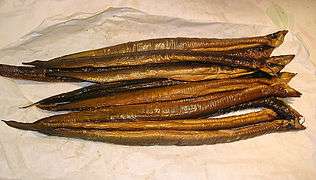 |
Main course or snack |
Smoked eel that is used as ingredient in various dishes. |
| Sauerkraut |
 |
Side dish |
Shredded cabbage that is naturally fermented by lactic bacteria. |
| Schlachteplatte |
 |
Snack |
A dish with a variety of meats usually eaten as second breakfast. |
| Spargel |
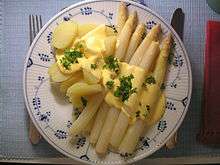 |
Side dish |
Asparagus that is eaten as a delicacy, commonly with potatoes and Sauce hollandaise. |
| Steckrübeneintopf |
 |
Main course |
A hearty stew made from rutabaga, carrot and potato. |
| Welf pudding |
|
Dessert |
A sweet two-layer pudding invented by a royal chef with one layer of vanilla-based and one of wine-based pudding. |
East Prussia
East Prussia, as Germany's easternmost province, was very often influenced by the cuisines of its surrounding neighbours: Russia and Lithuania to the northeast, and Poland to the south. The Russian borscht was adapted to the East Prussian palate, and Polish sausages were frequently found on the dinner table.
East Prussia's gastronomy also made extensive use of the abundant products from its dark, remote forests. Honey was often incorporated into recipes, and Kopskiekelwein, a fruit wine made from wild currants, was the favourite regional tipple alongside beer.
| Name |
Image |
Type |
Description |
| Bärenfang |
 |
Beverage |
A honey-flavored liqueur. |
| Beetenbartsch |
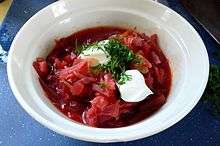 |
Soup |
A beetroot-based soup served with sour cream (Schmand) and beef (originally from Ukraine) |
| Königsberger Fleck |
|
Soup |
A type of Kuttelsuppe, or tripe soup. |
| Königsberger Klopse |
 |
Main course |
Meatballs served in a white sauce with capers and eaten with potatoes. |
| Königsberger Marzipan |
 |
Candy |
Special kind of marzipan made in Königsberg. |
| Kopskiekelwein |
|
fruit wine |
made from blackcurrants or redcurrants. |
| Pillkaller Machandel |
|
Beverage |
A clear liqueur that is served in a drink with liver sausage and mustard. |
| Schwarzsauer |
|
Soup |
A type of blood soup with various spices cooked in vinegar-water. |
| Spirgel |
|
Snack |
A variation of bacon. |
| Tilsit cheese |
 |
Cheese |
A kind of cheese. |
Franconia
| Name |
Image |
Type |
Description |
| Fränkische Bratwurst |
 |
Snack |
Fränkische Bratwurst is composed of beef, pork or veal and is traditionally served with sauerkraut or potato salad or simply in a breadroll. They vary greatly in size and seasoning from region to region but are often considerably thinner than the equivalents elsewhere in Germany. The best-known sausages are from Nuremberg (Nürnberg) and are recognisable by their small size and clearly visible herb seasoning. They are traditionally served as three sausages in a roll ("Drei in 'a Weckla") or six sausages on sauerkraut ("Sechs auf Kraut"). |
| Saure Zipfel |
 |
Snack |
Bratwurst and sliced onion cooked in vinegar and usually eaten with Bavarian pretzels. |
| Kartoffelklöße |
 |
Main course |
Large dumplings made from a dough consisting of raw or a combination of raw and cooked potatoes. The exact recipe is a matter of regional differences and personal belief. The best friend of pot-roasted meats or mushroom ragout. |
| Schäufele |
 |
Main course |
An entire pork (or, in some cases, Lamb) shoulder roasted in a fairly cool oven over long period so that the meat is extremely tender with a crunchy crust. Seasoning is usually simple using salt, pepper and caraway and traditionally it is served in a dark sauce, made from the roast stock, meat broth, and often dark beer and Lebkuchen spices. Accompanied by a side salad, dumplings and red cabbage or less commonly Sauerkraut. |
| Hochzeitssuppe ("wedding soup") |
|
Soup |
A spicy meat broth with bread dumplings, liver dumplings and finely sliced pancakes. |
| Lebkuchen |
 |
Pastry/Cookie |
German kind of gingerbread of which the most famous originates in Nuremberg and is traditionally only available at Christmas, although tourist demand means that Lebkuchen are available in some form practically all year round. |
| Karpfen |
|
Main course |
Fried carp that is traditionally served during carp season, which consists of all months of the year that contain an R in their German spelling. |
Frankfurt am Main and Hessen
| Name |
Image |
Type |
Description |
| Green Sauce |
.JPG) |
Dip |
A bright sauce made from an abundant amount of seven fresh minced herbs namely borage, sorrel, cress, chervil, chives, parsley, and burnet. Served with boiled potatoes and hardboiled eggs. Called "Grüne Soße" in German or "Griee Sooß" in the Hessian dialect. |
| Frankfurter sausage |
 |
Snack |
A smoked sausage made from pure pork, which is eaten hot and usually accompanied by bread and mustard. Not to be confused with the American hot dog "Frankfurter". |
| Apfelwein |
 |
Beverage |
A wine made of apples, somewhat comparable to Cider and French Cidre though dryer and more sour-tasting. Best enjoyed in traditional "Äbbelwoi-Lokalen". Served from a special jug (the "Bembel"), drunk with a special glass (the "Gerippte"). |
| Sauer Gespritzer |
 |
Beverage |
A very refreshing drink that combines Apfelwein with sparkling water. Usually served during summer it's also available as Süß Gespritzer which is Apfelwein mixed with lemonade. |
| Handkäse mit Musik |
 |
Snack |
Lt.: hand-cheese with music: A strong cheese made from curdled milk served in a dressing from vegetable oil, vinegar, caraway, salt and pepper and sliced onions. Usually served with rye bread and butter. Although people love to make jokes of dubious quality about the meaning of the "music", several traditional Kneipe sport a choice of Handkäs with and without "music" (the seasoning), thereby ruling out any reference to post-digestive side effects. |
Hamburg
| Name |
Image |
Type |
Description |
| Labskaus |
 |
Main course or snack |
A dish made from corned beef, herring, mashed potatoes, and beetroot, served with a fried egg and a pickled cucumber. See also under Bremen and Lower Saxony. |
| Birnen, Bohnen und Speck |
 |
Main course |
A dish composed of pears, beans and bacon, invariably accompanied by potatoes. |
| Hamburger Aalsuppe |
|
Soup |
A sweet and sour soup of eel, meat broth, dried fruits, vegetables, and herbs |
| Franzbrötchen ("frenchmans roll") |
 |
Pastry |
A pastry made from Phyllo dough, covered with sugar and powdered cinnamon that is usually eaten for breakfast. Franzbrötchen is only rarely found outside of Hamburg. |
| Frikadelle |
 |
Main course or snack |
A type of flat meatball composed of pork, beef and onions commonly eaten with pasta salad, potatoes or simply in a bread roll with mustard or other condiments. |
| Rote Grütze |
 |
Dessert |
A jelly/jam-like dessert or summer dish made from berries especially currants that can be eaten pure, but is often accompanied by milk or vanilla sauce. |
Lower Saxony
See Bremen and Lower Saxony
Mecklenburg-Vorpommern
| Name |
Image |
Type |
Description |
| Mecklenburger Rippenbraten |
 |
Main course |
Rib roast, made from belly of pork including meat of the upper rib, stuffed with Boskoop apples, prunes, cinnamon, rum and zwieback, usually served with Klöße or red cabbage. |
| Tüffel un Plum |
|
Main course |
A potato stew made with smoked ham, prunes, potatoes and spiced with clove and bay leaves. |
| Rode Grütt |
 |
Dessert |
Dessert sauce made of berries, usually served with vanilla sauce |
| Grööner Hein or Birnen, Bohnen und Speck ("pears, beans and bacon") |
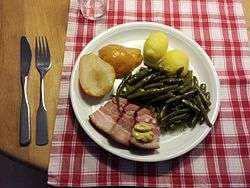 |
Main dish |
Stew made from string beans, pear and ham |
| Fliederbeersuppe |
|
Dessert |
Dessert soup made from elderberry, served with semolina dumplings |
| Sahnehering ("Herring in Cream") |
 |
Main course |
Young herring marinated in cream, with onions and sometimes pears or apples. Served with Bratkartoffeln or Pellkartoffeln. |
| Schwedeneisbecher ("Sweden Ice Cup") |
 |
Dessert |
Vanilla ice, served with apple sauce, whipped cream and a waffle, optionally with advocaat liquor. Typical GDR dessert, still very popular. |
Palatinate
| Name |
Image |
Type |
Description |
| Saumagen (Pork stomach) |
 |
Main course |
A pork's stomach that serves as casing for a filling of pork, sausage meat and potatoes. Sometimes the filling also contains eggs and carots. The dish is usually served with mashed potatoes and sauerkraut, bread or Bratkartoffeln. |
| Gequellde mit weißem Kees |
|
Main course |
A dish of cooked potatoes with curd cheese. |
| Gequellde mit Lewwerworscht |
|
Main course |
A dish of cooked potatoes with liver sausage. |
| Gedadschde |
 |
Side dish |
In a pan fried dumplings made of mashed potatoes with flour. |
| Weck, Worschd un Woi |
 |
Snack |
Lt.:Bread roll, sausage and wine |
| Grumbeersupp un Quetschekuche |
 |
Main course |
Potato soup and plum tart |
| Kerscheblotzer (cherry cake) |
 |
Dessert |
Kind of bread pudding made with cherries and usually served hot with vanilla sauce. |
| Zwiebelkuchen |
 |
Main course |
An onion pie usually served with Federweisser. |
| Federweisser |
.jpg) |
Beverage |
Young white wine. |
| Chestnuts |
|
Side dish |
Cooked chestnuts served with meat or other things. |
Rhineland
| Name |
Image |
Type |
Description |
| Rheinischer Sauerbraten |
 |
Main course |
Large pieces of beef or more traditionally horse meat, marinated in a spicy water-vinegar mixture for a long time before baking. |
| Reibekuchen |
 |
Side dish |
Potato fritter with black bread, apple syrup, sugar beet syrup or stewed apples. |
| Blutwurst |
 |
Snack |
Blood sausage either cured or fried. |
| Himmel und Ääd |
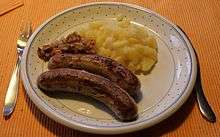 |
Main course |
Lt.: Sky and Earth: Mashed potatoes with stewed apples and fried blood pudding (Cologne). Potatoes are also called 'Erdäpfel', what means 'ground apples', lt: earth apples, so it's a meal prepared out of 'apples' which grow above and under the earth |
| Halve Hahn |
 |
Snack |
Lt.:Half Rooster: A dish that doesn't actually contain rooster at all but is a cheese sandwich with onions, the name is based on a wordplay (Köln). |
| Muscheln rheinische Art |
 |
Main course |
Mussels cooked in wine with vegetables and served with whole wheat bread and some butter. |
| Grünkohl |
 |
Side dish |
Dish of cooked kale often served with potatoes and Kassler. |
| Mettbrötchen |
 |
Snack |
Minced raw pork on bread rolls with raw onion rings or diced raw onion. |
| Aachener Printen |
 |
Pastry |
Popular kind of cookie that originates in the city Aachen. |
Saarland
| Name |
Image |
Type |
Description |
| Dibbelabbes |
 |
Main course |
A potato hash prepared from raw grated potatoes, bacon and leeks, and baked in a Dibbe, or pot, usually eaten with apple sauce. |
| Hoorische/Verheiratete |
|
Main course |
Lt.: Married ones: Potatoes and dumplings made of flour served with a creamy bacon sauce. |
| Schwenker or Schwenkbraten |
 |
Main course |
Pork steaks, marinated in spices and onions and broiled on a grill that hangs on a chain over a wood fire). |
Saxony
| Name |
Image |
Type |
Description |
| Pfefferkuchen |
 |
Pastry/Cookie |
Famous kind of German gingerbread. Some believe that the best German gingerbread is from Pulsnitz in Saxony. |
| Eierschecke |
 |
Cake |
A cake consisting of three layers: The bottom one is either a yeast dough (Hefeteig) or one made with baking soda (Rührteig), the middle layer is a cream made of quark, vanilla and some butter, egg, sugar and milk, and the top layer is mainly made from eggs (Eier), which are beaten with butter, sugar and "Vanillepudding"-powder (starchy substance normally used to cook a dessert similar to semolina pudding). |
| Quarkkeulchen |
 |
Main course or dessert |
A sweet main dish made from quark, mashed boiled potatoes, a little flour, an egg and some grated lemon peel. The ensuing dough is baked as small, less than palm-sized pancakes and eaten hot with sugar and cinnamon, or with fruit, whipped cream, vanilla ice cream etc. |
| Leipziger Allerlei |
|
Side dish |
A vegetable dish consisting of peas, baby carrots, white asparagus and morels. It may also, but not necessarily, contain broccoli, cauliflower, green beans or corn, even small prawns. |
| Stollen |
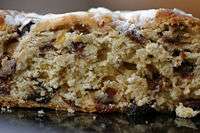 |
Cake |
German Christmas cake of which there are two important centers in Saxony: Dresden and the Ore Mountains. |
Note: The cuisine of the Saxon part of the Ore Mountains is more a relative of the cuisine of Franconia than a relative of the other parts of Saxony. The cuisine of Upper Lusatia also differs from central Saxony and is more related to the (former) cuisines of Lower Silesia and Northern Bohemia. Typical Upper Lusatian dishes are:
- Stopperle: small dumpling with fried bacon or sausage and sauerkraut.
- Schälklöße: soup consisting of filled pasta and various vegetables.
- Teichelmauke: mashed potatoes with bouillon and cooked beef.
Saxony-Anhalt
Typical for very traditional dishes from Saxony-Anhalt is the combination of bitter or hearty meat dish with sweet. Sweet pancakes in Green bean soup for example are the cause of many jokes.
| Name |
Image |
Type |
Description |
| Baumkuchen |
 |
Cake |
A cake typical for Christmas that is very difficult to prepare. |
| Magdeburger Schmalzkuchen |
 |
Pastry |
Fried pastry made from yeast dough, topped with confectioner's sugar and usually consumed for carneval. |
| Bötel (Magdeburg) |
 |
Main course |
Ham hock that is usually served with mashed potatoes or bread and sauerkraut. |
| Schierker Feuerstein |
 |
Beverage |
A herb liqueur. |
| Rotkäppchen Sekt |
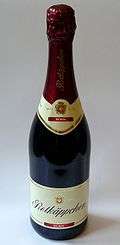 |
Beverage |
A brand of sparkling wine. |
Schleswig-Holstein
| Name |
Image |
Type |
Description |
| Birnen, Bohnen und Speck |
 |
Main course |
A dish composed of pears, beans and bacon, invariably accompanied by potatoes . |
| Buttermilchsuppe |
|
Soup |
Buttermilk soup with flour dumplings |
| Kohl |
 |
Side dish |
Cooked kale usually served with potatoes and Kasseler or other foods. |
| Kieler Sprotten |
 |
Main course |
Smoked Baltic sprats. |
| Labskaus |
 |
Main course or snack |
A dish made from corned beef, herring, mashed potatoes, and beetroot, served with a fried egg and a pickled cucumber. |
| Mehlbüdel |
 |
Main course |
A large flour dumpling served with bacon and a sweet sauce. |
| Rote Grütze |
 |
Dessert |
A jelly/jam-like dessert or summer dish made from berries especially currants that can be eaten pure, but is often accompanied by milk or vanilla sauce. |
| Schnüsch |
|
Main course |
A stew made of ham, potatoes and vegetables cooked in roux. |
| Schwarzsauer |
|
Soup |
A sort of black pudding made with vinegar. |
| Snuten un Poten |
|
Main course |
Cured pig snouts and trotters that are cooked in vinegar together with several spices. Traditionally served with sauerkraut, erbspüree and hot mustard. |
Silesia
When Silesia was German, the influence of neighboring countries was clear in Silesian cooking; Polish carp and cheeses, Bohemian goulash, Austrian sausage and Pfefferkuchen (pepper cakes). Schnapps was very commonly drunk with beer in Silesia. There was an old saying that went "Silesia has two principal rivers, Schnapps and the river Oder".
| Name |
Image |
Type |
Description |
| Schlesisches Himmelreich |
 |
Main course |
Lt.:Silesian Heaven: a dish of pork belly with dried fruits and cinnamon. |
| Kartoffelsuppe |
 |
Soup or stew |
A stew made with raw potatoes and other ingredients such as vegetables and sausage. |
| Gänsebraten (Roast goose) |
 |
Main course |
Roasted goose traditionally served with potatoes and/or Klöße with gravy and vegetables. |
| Schlesische Kartoffelklöße |
 |
Main course |
Silesian potato dumplings. |
| Schlesischer Striezel |
|
Cake |
Silesian Christmas cake made from yeast dough. |
| Schlesischer Mohnstollen (Silesian poppy cake) |
 |
Cake |
Silesian Christmas cake made from yeast dough and filled with poppy seeds. |
| Liegnitzer Bomben |
|
Pastry/Cookie |
Honey cakes from Liegnitz. |
Thuringia
| Name |
Image |
Type |
Description |
| Thuringian sausage |
 |
Snack |
Red to grey, stuffed in a natural casing of pig intestine, unlike the white Franconian variety. |
| Thüringer Rostbrätel |
 |
Main course |
A pork neck steak marinated together with onions in beer and mustard. |
| Thüringer Klöße |
 |
Main course |
Dumplings made of raw and/or cooked potatoes with pan-fried toast-bread inside. |
| Mutzbraten |
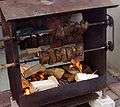 |
Main course or snack |
A pound of mutton, roasted on open birchwood fire, served with sauerkraut. |
| Rinderroulade |
 |
Main course |
Beef roulades: Spread with mustard and filled with bacon, onions and (in some areas) pickled cucumber. |
| Mohnkuchen |
 |
Cake |
Poppy seed cake |
| Käsekuchen |
 |
Cake |
Cheesecake made from quark (cheese) either with or without pie crust (usually shortcrust pastry). |
| Eichsfelder Schmandkuchen |
|
Cake |
A sheet cake made from yeast dough, topped with fruit or quark cheese and covered with a layer of Schmand. |
| Weimarer Zwiebelkuchen |
 |
Cake (savoury) |
A sheet cake made from yeast dough with onions, sour cream, bacon bits and eggs. |
| Altenburger "Aufläufer" (Prophetenkuchen) |
|
Cake |
A speciality cake from Thuringia that consists of eggs, sugar, oil, flour and alcohol (usually rum). |
Westphalia
| Name |
Image |
Type |
Description |
| Pickert |
 |
Main course |
Potato pancakes |
| Grünkohl und Kohlwurst (curly kale and cabbage sausage) |
|
Main course |
A sausage made from lung and served with Grünkohl. |
| Westfälischer Schinken (smoked ham) |
|
Snack |
A hearty ham from Westfalen that is very aromatic. |
| Möpkenbrot |
|
Snack |
Kind of blood sausage that contains rye bread, pig-blood, milk, eggs, fat, salt and pepper. |
| Rumpsteak |
 |
Main course |
Roast beef served with various sides such as potato wedges and vegetables. |
| Reibekuchen |
 |
Side dish |
Fried dumpling made of mashed potatoes and other ingredients such as onions, eggs, quark and spices. |
| Pumpernickel |
 |
Bread |
A hearty bread; it goes black because the sugar in the bread goes to caramel. |
| Herrencreme |
 |
Dessert |
Lt.: Gentleman's creme: Vanilla jelly with cream and rum. |
| Stippgrütze |
 |
Snack |
Barley groats cooked in sausage juices (Wurstbrühe), which are enriched with pieces of meat, offal, such as heart, kidney or liver and seasoned with spices and salt. The cooked ingredients are minced after the juices have been poured off and a crumbly cake is left which is held together with fat and which sets on cooling. |
See also
|
|---|
Dishes
by origin | |
|---|
By origin
and type | Breads | |
|---|
| |
|---|
| |
|---|
| |
|---|
Soups and stews | |
|---|
Snack foods | |
|---|
Misc. | |
|---|
|
|---|
| By type | |
|---|
-
 Food portal Food portal
-
 Category: Lists of foods Category: Lists of foods
|


















_1.jpg)













.jpg)
.jpg)

























































.jpg)




































